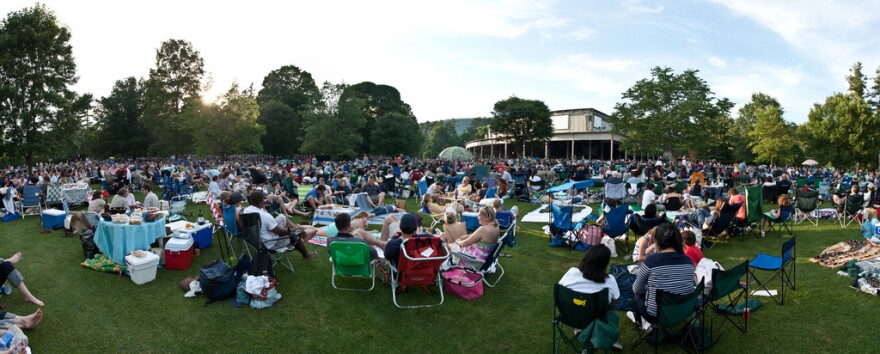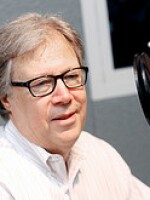Memorial Day now behind us, it's time to take out the calendar and begin the serious business of penciling in the summer concert-going plans.
I don’t think I need to point out that we are blessed to have, virtually in our backyard, some of the greatest warm-weather music attractions anywhere. Here are a few of the more celebrated ones; a little later, perhaps, I will talk about some of the smaller ones.
First and foremost: Tanglewood.
I’m not especially into ranking things, but I think it’s fair to say that -- based on its track record of having trained an astoundingly large percentage of the world’s leading conductors and musicians, as well as its storied concert history, as well as, what the heck, tossing in the sheer beauty and tranquility of the place -- Tanglewood, up in Lenox, Massachusetts, should be called the premier classical music festival on the planet.
It is, of course, primarily the summer getaway of the Boston Symphony Orchestra (BSO). It has been the BSO's warm weather home since a stormy night in August, 78 years ago, when the BSO assembled on folding chairs under a rented tent and played Wagner, until a sudden monsoon kicked up and sent a couple of thousand well-dressed swells scrambling to their cars.
Its now iconic 5,100-seat open-air “shed” was christened the following summer, and remains the centerpiece of the rolling campus in the foothills of the Berkshires.
But Tanglewood is more than the BSO. Its young musician training arm, now called the Tanglewood Music Center, gathers together the most talented 20-somethings from around the world and prepares them for the orchestral life. (This summer, incidentally, marks the 75th anniversary of the TMC, and various acknowledgements will be taking place during the season.)
There is also the weeklong Festival of Contemporary Music, the ongoing chamber and smaller-scale concerts in the cozier 1,200-seat Ozawa Hall, the Boston University Tanglewood Institute for high school students, along with assorted lectures, walks, seminars, and other gently edifying stuff.
It’s a place that just sort of seems destined to have materialized on this handsome, history-soaked parcel.
I’m always amazed, and slightly irritated, when I hear people who have lived around here for any length of time say to me, “Oh, yeah, Tanglewood. We keep meaning to go up there, but we haven’t done it yet.” Go already.
If I may quote from a piece I wrote a few summers ago:
On a soft, star-filled July night, with just a hint of breeze stirring the tall pines and oaks that dot the gently rolling lawns up here, and with the sound of some sparkling Mozart overture or fiery Mahler Symphony wafting out over the Berkshire foothills, and with the rich history of this stunning region adding its own romantic counterpoint, it's hard to avoid the thought: How many better ways to spend a summer evening can there be?
Norfolk Chamber Music Festival
This bucolic little spa bills itself, plausibly, as the oldest summer music festival in North America. Its heritage (fascinating but not that well known, for some reason, even in these parts) reaches back to the late 1800s, when the prosperous and arts-loving Battell family conceived of a series of warm-weather musical evenings on their rolling estate just off Route 44.
Over the decades, the Norfolk site has hosted a succession of celebrated performers and conductors and composers, among them, in the early years of the 20th century, Sibelius, Vaughan Williams and Rachmaninoff. In recent decades, the festival has welcomed virtually every important chamber music ensemble in the world, often multiple times.
Today, the festival is an activity of the Yale School of Music and its mission embraces the training of young soloists and ensembles along with the presentation of established artists.
The focal point of the campus is the shingled 900-seat music shed, built in 1906 and modified several times during its lively century of existence.

As it happens the shed is currently undergoing a multi-year, multi-million dollar restoration; much of the exterior renovation, including the addition of a crowning cupola, will be on view this summer. (If you have ever visited the shed on a really sweltering August night, you will be pleased to learn that the cupola discreetly houses a large fan, whose purpose is to quietly draw hot air up and out of the building.)
Picnicking is a hallowed tradition, although these days concertgoers also have the option of a pleasant preconcert dinner at the exquisite Infinity Hall and Bistro, which is literally across the street on Route 44.
Music Mountain
As beguiling as they are, the physical ambiance of Tanglewood and Norfolk could be described as, let us say, countrified suburban.
For more rusticity, make the backroads trek to the very Northwest corner of Connecticut, and then up the hill, to Music Mountain in the Falls Village section of Canaan. This trim little chamber music mecca has been hosting the world’s great string quartets – plus jazz and a few other things – since the 1930s.

The 300-seat MM shed (odd that that term, as it applies to summer festivals, can mean anything from a place that sits a few hundred to five thousand) is an acoustical gem, and the grounds are hospitable to flower lovers and picnickers.
Finally, I know it’s more of a road trip, but I have to add here Glimmerglass Opera, over in the Catskills of eastern New York State.
It’s impressive, to begin with, that tiny Cooperstown, New York (pop. 1,834) should feature important monuments to two of Western civilization’s most abiding achievements: baseball and opera.

The National Baseball Hall of Fame is, of course, a charming, lovingly conceived and beautifully executed shrine to the American pastime. It should be experienced by everyone, whether or not they can name the year that Bill Mazeroski hit his series-clinching walk-off homer against the Yanks. (1960, to save you the trouble.)
A more recent addition to the landscape is Glimmerglass Opera, whose graceful 900-seat Alice Busch Theater opened in 1987. It, too, is an edifice worth driving a couple of hours to experience. (Incidentally, the drive to Cooperstown, almost irrespective of which route you take, is itself a summer pleasure worth savoring.)
Glimmerglass typically presents four mainstage productions a year, presented in repertory – this year, they are Mozart’s “The Magic Flute,” Verdi’s “Macbeth,” Vivaldi’s “Cato in Utica” and Bernstein’s “Candide.”
Note that the conductor for “The Magic Flute” will be our own Carolyn Kuan, who is becoming a Glimmerglass regular.
To say it once more, go already.
Steve Metcalf was The Hartford Courant’s fulltime classical music critic and reporter for over 20 years, beginning in 1982. He is currently the curator of the Richard P. Garmany Chamber Music Series at The Hartt School. He can be reached at spmetcalf55@gmail.com.


